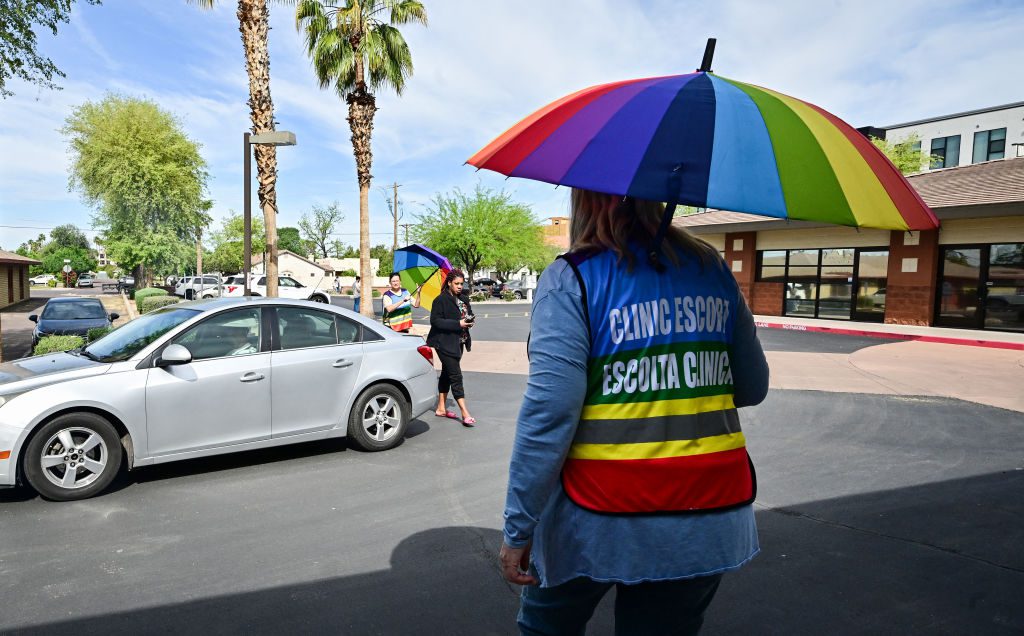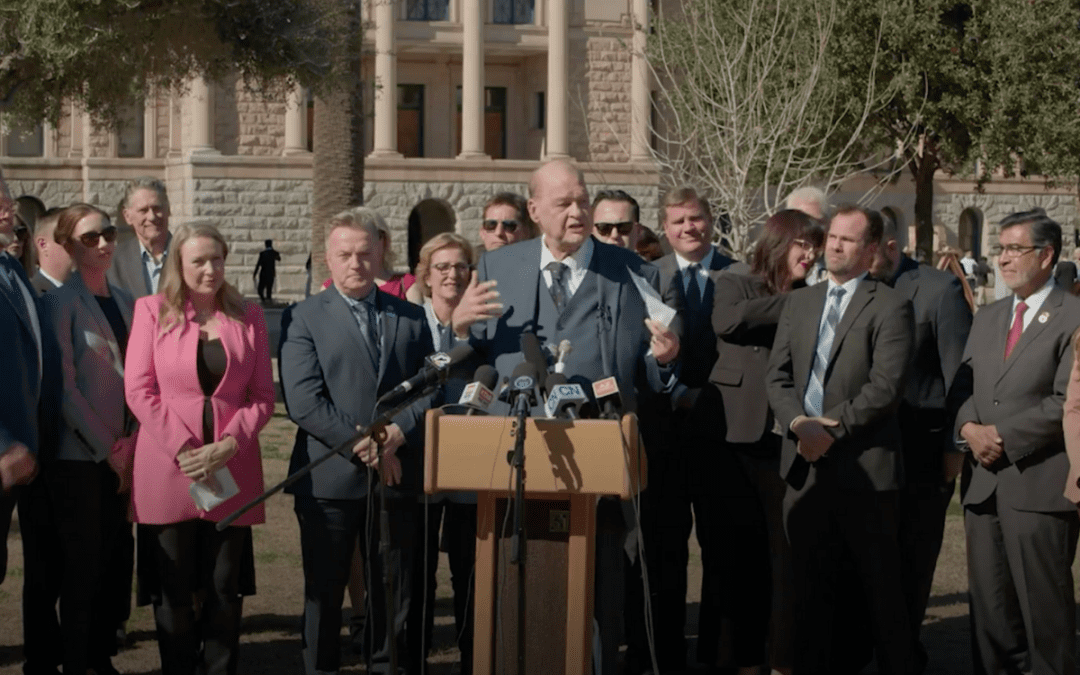
State Senator John Kavanagh speaking on the floor of the Arizona State Senate at the Arizona State Capitol building in Phoenix, Arizona. Photo by Gage Skidmore.
A misunderstanding of the lives that transgender students live every day fuels the fire of anti-trans legislation that continues to be introduced year after year—and in one instance, understanding is what stopped one such proposal in its tracks.
Republicans quickly passed two of these bills in February, but a third proposal that singled out transgender students was blocked by one standalone Republican.
Bills focus on preferred pronouns, restroom restrictions
Senate Bill 1166, sponsored by Sen. John Kavanagh, R-Fountain Hills, would require teachers to notify parents of their child’s preferred pronoun or name use within five days of when the student requests the teacher use preferred pronouns or a name that doesn’t match the biological sex or given name the child was enrolled under
SB 1182, also sponsored by Kavanagh, would mandate that schools separate shower and bathroom facilities by biological sex, prohibiting transgender students from accessing areas consistent with their gender identity and requiring schools to provide separate spaces for transgender students who refuse to use the areas designated for them on the basis of their biological sex.
Senate Concurrent Resolution 1013—which combined the language from both SB1182 and SB1166—was shot down by Sen. Ken Bennett, R-Prescott. If it had passed it would have made its way past Gov. Katie Hobbs’ veto and be sent directly to the voters on the 2024 ballot.
Hypotheticals clash with reality
Bennett decided to vote against the measure after meeting with a transgender student, who shared their lived experience in a way that sincerely impacted the Republican senator, the Arizona Agenda reports.
Kavanagh, who has introduced bills attacking transgender Arizonans year after year, hopes that Hobbs and other opponents of the previous bills would “at least respect the right of parents to know what’s going on.”
“My bills protect the privacy of non-transgender students by ensuring that when they go into showers at school, which are communal showers, there will not be somebody of a different biological sex,” Kavanagh told The Copper Courier. “The bill respects the privacy of 99% of students, while also respecting the privacy of transgender students because it requires that the school provide them with an alternative shower facility.”
But legislators who have worked in education, like Rep. Nancy Gutierrez, D-Tucson, have pointed out in debates that communal showers aren’t built into schools anymore, and the scenarios proposed by her Republican counterparts aren’t grounded in reality.
Hobbs has voiced similar sentiments, and has repeatedly vetoed any anti-LGBTQ bills that reach her desk. Her actions come as a stark contrast to that of her predecessor, Doug Ducey, who ushered in a wave of anti-LGBTQ laws. With Hobbs in the governor’s office, people feel a little more security, said Gaelle Esposito, a lobbyist for the Arizona chapter of the American Civil Liberties Union.
“They’re [the bills] based on…a caricature and a boogeyman that they’ve [Republicans] drawn, based on their misunderstanding and fear and prejudice of a very small community,” Esposito said.
“It is very much apparent that the so-called problems outlined in these three pieces of legislation do not exist,” said Bridget Sharpe, Arizona state director for the Human Rights Campaign (HRC AZ). “It’s just a made up problem by a very small group of folks who have decided to demonize transgender and non-binary students.”
Politicians have no right to make these decisions for Arizonans, Sharpe said, and it’s wrong to single out and attack anyone—especially transgender and non-binary students—just for living their lives and being who they are.
Searching for non-discriminatory districts
For years, Lizette Trujillo has driven her 16-year-old son Daniel, who is transgender, hours from their home to attend a different school district—one that has non-discrimination policies that protect him from gender and sexuality discrimination.
Daniel has always had access to a bathroom that aligns with his gender and received support from peers and teachers – allowing the majority of his mental energy to go to the things that he needs to focus on: school.
“Because he’s in a school district that is super supportive, he’s really been able to thrive as a student and I feel like his experience is not the norm,” Trujillo said.
But not all households are as accepting as the Trujillo’s. Democratic lawmakers and LGBTQ advocates raised concerns that requiring teachers to notify parents of their child’s change in pronouns or gender identity would place some students with unaccepting homes in danger.
“If a parent is supportive already, then this bill is nothing more than annoying, but if the parents are unsupportive, then this can have some pretty damaging consequences for that young person,” said Sen. Christine Marsh, D-Scottsdale, in the bills’ committee hearing.
When students face situations where their parents may kick them out of their home or subject them to violence, Kavanagh told The Copper Courier he is confident that school resource officers and child protective services will intervene.
The thought that parents would throw their kids out or use violence if they found out that they were transgender “paints a dim view of parenting in our country, I think the overwhelming majority of parents would do the right thing,” Kavanagh said in the bills’ committee hearing.
But, LGBTQ youth are at 120% higher risk of reporting homelessness, with 40% of the homeless youth population identifying as LGBTQ, according to data compiled by the Governor’s Council on Child Safety and Family Empowerment.
“Kids have gotten kicked out of their homes for coming out to their parents, or coming out as transgender or non-binary to their parents,” Sharpe said. “We value the parent-teacher relationship, but it’s up to the parents to work with their child and make those decisions, but it’s also a teacher’s responsibility to protect their students.”
Searching for non-discriminatory states
15-year-old Skyler Morrison has been advocating for transgender rights since she was seven years old, and feels that the lawmakers proposing these bills do not have her best interest at heart.
“A lot of my friends who are closeted will be harmed, if they’re forced to…come out to their parents,” Morrison said.
The Morrison family left Texas – where Skyler had been subject to invasive bathroom bills – for Arizona in 2017. Those same laws passed in Texas were one of the deciding factors in their move.
Texas and Arizona are two of the top 10 states from which respondents moved because of laws targeting transgender people, according to 2022 data from the US Trans Survey.
Nearly half of the survey’s respondents had thought about moving to another state because their state government considered or passed laws that target transgender people for unequal treatment.
“I don’t really think that the bills are solving any issues,” she said. ”The issues aren’t within the trans community, they’re within society.”
Skyler has heard similar negative rhetoric surrounding the transgender community her whole life, said her mother, Chelsa Morrison, and that it affects families and children’s mindsets.
“What they’re trying to do is create issues where there aren’t any. We have actual real things that we need to be talking about in this state,” Chelsa said. “They’re [transgender children] not focused on parts, they’re focused on hearts.”
Something missing from the conversation, Chelsa believes, is that teachers are often critical for students’ survival when there is no one else to support them—in situations beyond pronouns or gender identity.
Politicizing children
HRC AZ met with legislators and families the day before the bills were heard in the Senate Education Committee on Feb. 7. Families like the Morrisons expressed that students do not care whether their classmates are non-binary or transgender; they are supportive and do not care about who uses what bathroom.
“This is not an issue, this is a falsehood that has been drummed up by anti-equality legislators,” Sharpe said. “I think this is an opportunity by [the far right] to distract people from the real issues that are impacting Arizona schools.”
It will cause problems with teachers and administrators who will have to enforce these bills, Sharpe said, and the negative effects will fall on the backs of students who just want to be accepted and be who they are.
Through working with parents and youth from across the state, when non-binary or transgender students are told to use the nurse’s bathroom, they are made to feel less-than, weird, or different, Sharpe said. She added that it’s not uncommon for transgender students to hold it until they can go home, where they feel safe – and so they can avoid being viewed as the kid that needs to use the nurses’ restroom.
In addition to the physical discomfort, putting transgender youth in this position can take a toll on their mental health.
“I think the far greater danger is the fact that so many of these transgender students, according to even to their advocates, suffer from depression and some have suicidal thoughts,” Kavanagh told The Copper Courier. “Depriving parents of that knowledge, which would allow them to get psychiatric care for the child, exposes those kids to the danger of of suicide and mental anguish.”
41% of LGBTQ young people seriously considered attempting suicide in the past year, according to the Trevor Project’s 2023 U.S. National Survey on the Mental Health of LGBTQ Young People.
But, according to the same survey, fewer than 40% of LGBTQ young people found their home to be LGBTQ-affirming and nearly 2 in 3 LGBTQ young people said that hearing about potential state or local laws banning people from discussing LGBTQ people at school made their mental health a lot worse, such as laws that Kavanagh has introduced.
Thirteen bills placing attacks on Arizona’s LGBTQ community are being tracked by the Human Rights Campaign this legislative session, many are either dead or can expect to be vetoed.
Politics

How to apply for a job in the American Climate Corps
The Biden administration announced its plans to expand its New Deal-style American Climate Corps (ACC) green jobs training program last week. ...


AG Mayes says earliest day Arizona’s 1864 abortion ban can be enforced is June 27
Arizona Attorney General Kris Mayes says the earliest day the state’s 1864 abortion ban can be enforced is June 27. The Arizona Supreme Court on...
Local News



How to apply for a job in the American Climate Corps
The Biden administration announced its plans to expand its New Deal-style American Climate Corps (ACC) green jobs training program last week. ...


Basha’s sisters Gabriella and JJ Garcia share unique bond through sports
Sisters Gabriella and JJ Garcia are outstanding athletes at Basha High in Chandler who share a strong bond of friendship and inspiration. CHANDLER –...






